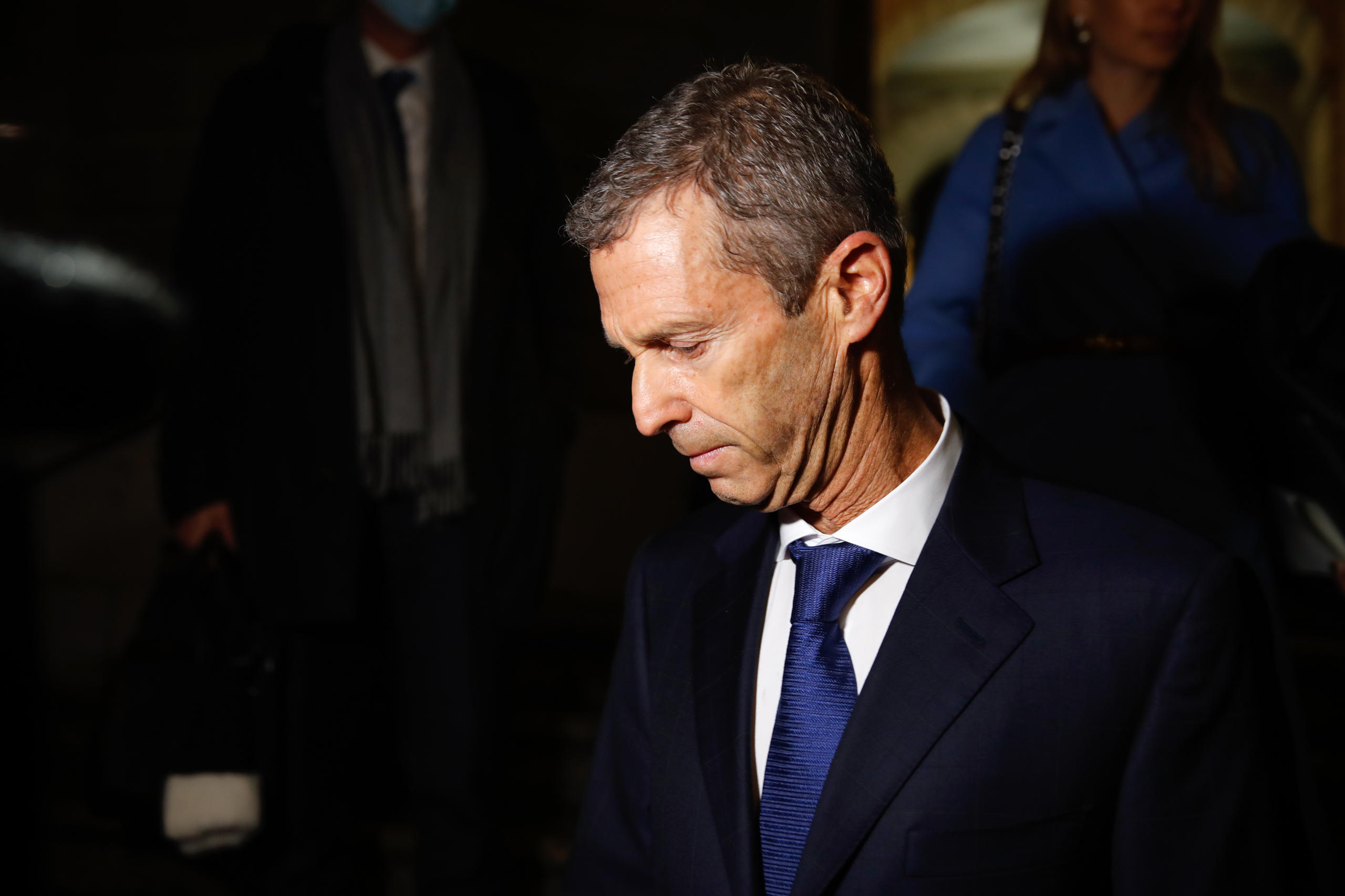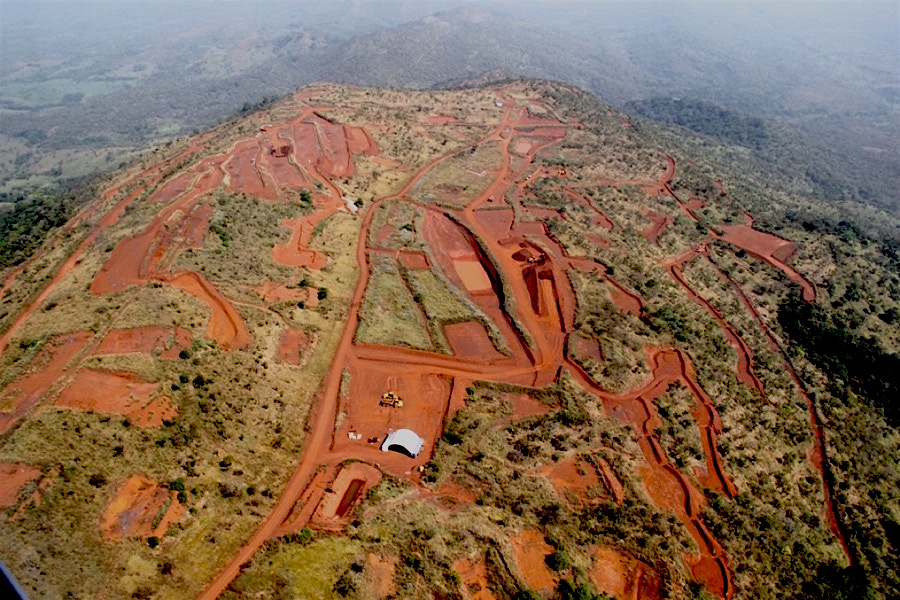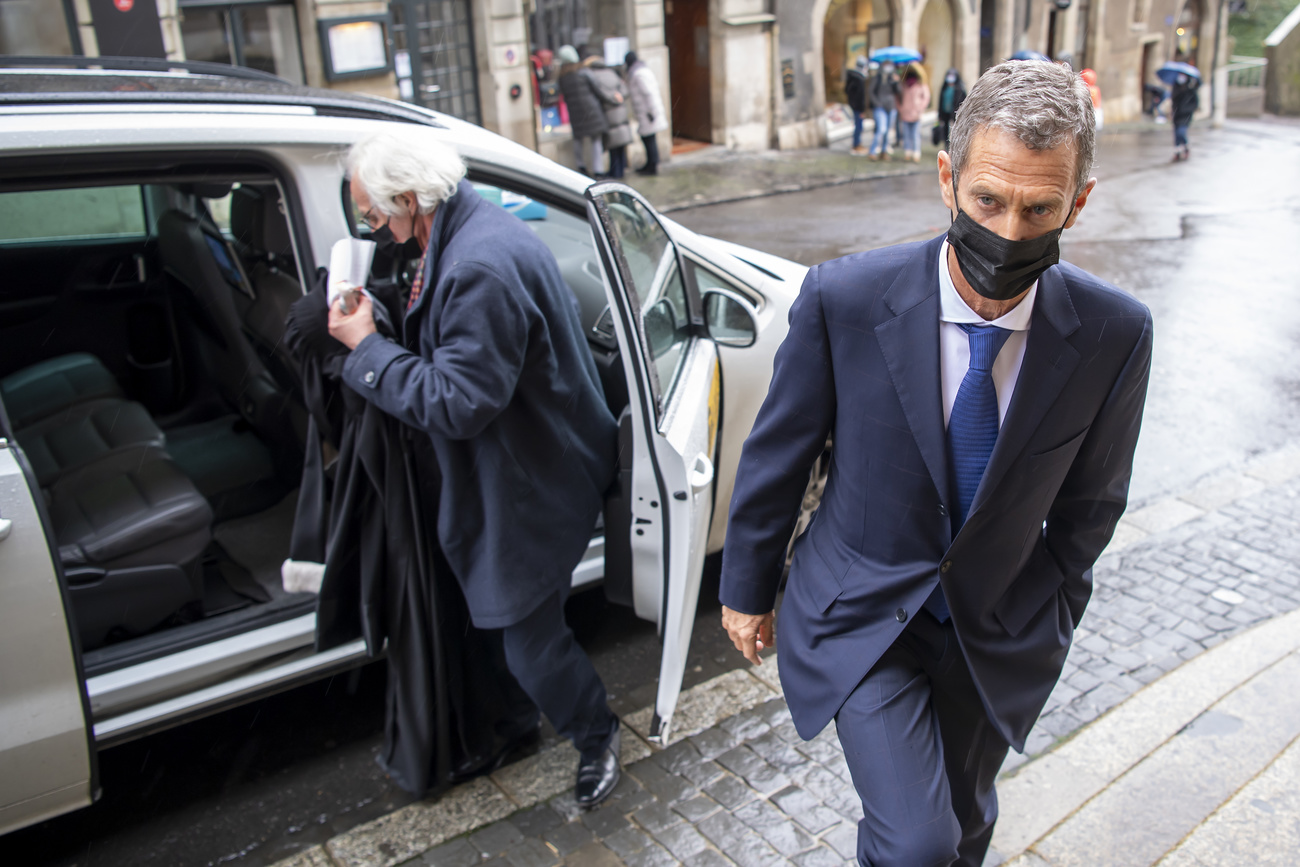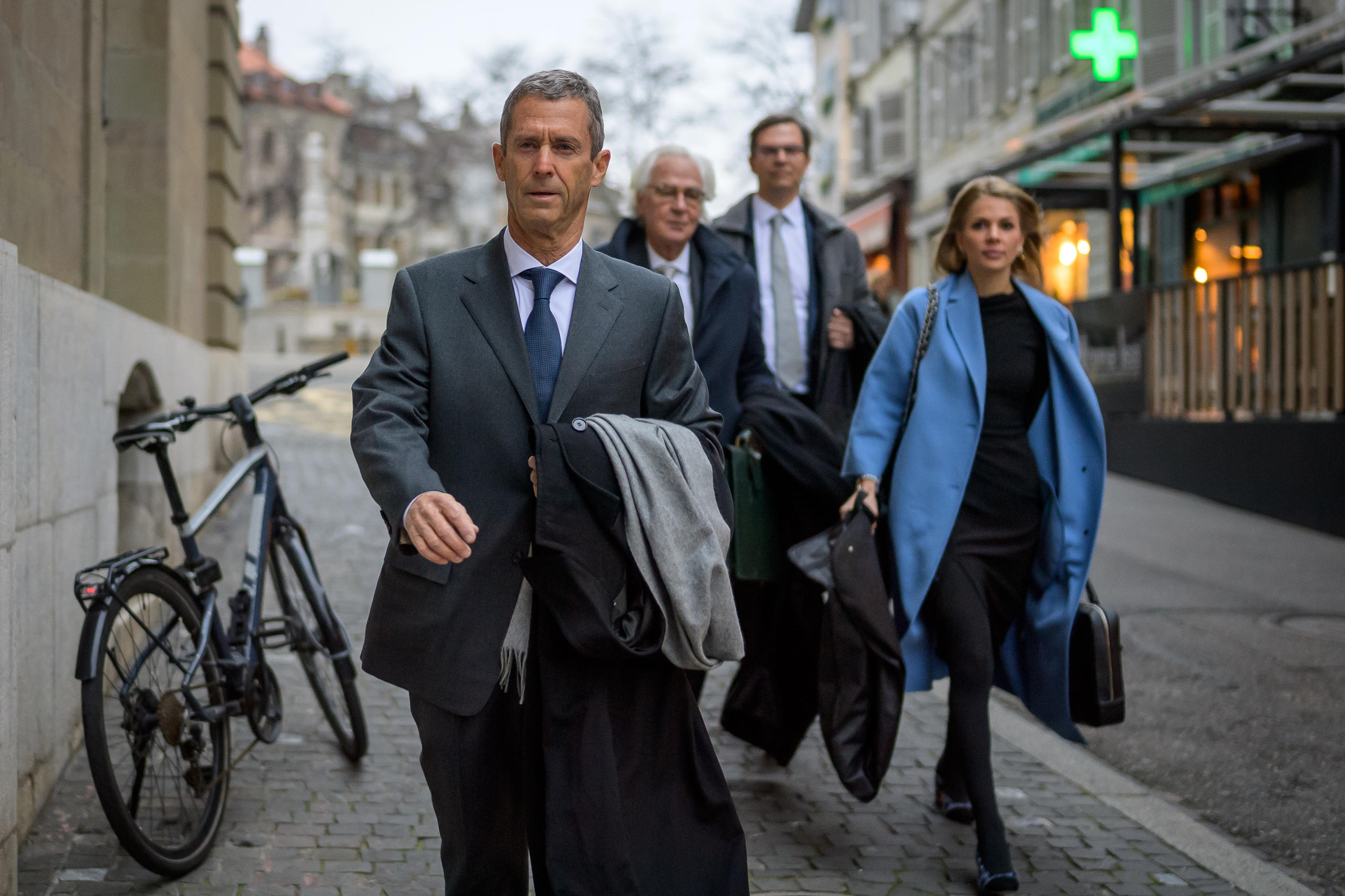How a mining corruption trial could be a turning point for dodgy offshore companies

More than seven years after his former Geneva home was searched, Franco-Israeli businessman Beny Steinmetz was sentenced last Friday to a five-year prison term on charges of corruption and document forgery in a landmark case that will resonate far beyond Geneva’s Palais de Justice.
Seating in the court room on the final day of a two-week trial was sparse due to social distancing measures. Flanked by his lawyers, Steinmetz, one of Israel’s wealthiest men, sat opposite the iron-faced prosecution team as the judge read, for over two-and-a-half hours, the facts of the case and conviction. When he finally emerged from the room, he was shaken.
“It is a big injustice,” he uttered when asked by journalists about the verdict. His lead lawyer, Marc Bonnant, said he would appeal the decision.
The trial focused on the roles Steinmetz and two associates played in bribes to a wife of the late president of Guinea, Lansana Conté and meetings with other government officials, to facilitate the acquisition of vast untapped iron ore reserves in the country’s Simandou region.

A delivery of sugar from Brazil, false boat rental contracts and even a forged order for machinery from building equipment giant Caterpillar were just a few of the many deals made to hide corrupt payments made by the diamond mogul in exchange for assuring control of what was known in the African nation as “the jewels of Guinea’s crown.”
The Swiss investigation, which began in 2013, charted how Steinmetz had conceived a “corruption pact” with Conté and his fourth wife Mamadie Touré, to obtain rights over the mines and oust a competitor, Anglo-Australian mining firm Rio Tinto. The court said the businessman and his company Beny Steinmetz Group Resources (BSGR) paid $8.5 million (CHF7.65 million) in bribes to Touré, partly though Swiss accounts. An array of lawyers, bankers and advisers located in a number of countries (Israel, the United States and British Virgin Islands), and often coordinated through a BSGR firm, Onyx Financial Advisors in Geneva, enabled the scheme.
Securing the concession only weeks before Conté’s death, in 2009, BSGR, registered in English Channel tax haven island Guernsey, acquired the Simandou mine at a cost of $165 million (CHF144 million). Eighteen months later it sold half of it to Brazilian mining company, Vale, for $2.5 billionExternal link (CHF2.18 billion). At the time, the GDP per capita in Guinea was $559 (CHF487), according to the World BankExternal link.

More
Swiss court hands diamond magnate five-year prison sentence
Landmark trial
This is the first time an international corruption trial has been held in Geneva. The trial may also mark a turning point for beneficiaries of offshore companies linked to illegal acts, according to experts.
Agathe Duparc, a researcher at the Swiss campaign group Public Eye described the trial as “historic”. “It is the first time that individuals of this stature are in the dock in a case involving a mining company being sued in numerous other jurisdictions,” she said.
For Mark Pieth, a professor of criminal law at the University of Basel and anti-corruption expert, the hearings are a sign that Switzerland, and particularly Geneva, are capable of dealing with foreign bribery. “That alone is very positive, no matter what the outcome.”
He said the trial comes at a global turning point, when beneficiaries of companies, such as Steinmetz, may no longer be able to hide behind legal setups to avoid responsibility. Citing recent legislation in the United States, including the Corporate Transparency Act that establishes a beneficial ownership registry, Pieth said Switzerland was moving towards greater transparency.

“Advisors” no more?
Steinmetz, who lived at the time of the events in Geneva where he benefited from a tax package, has always denied involvement in the bribes. His main argument, which is posted on his personal websiteExternal link, is that he was just an advisor to the company bearing his name. But evidence presented during the hearings included emails addressed to him about relations with Touré and the transcript of an FBI recording of a BSGR go-between, Frédéric Cilins, asking Touré to destroy any compromising documents in accordance to ordersExternal link from SteinmetzExternal link.
“I was an adviser of Beny Steinmetz Group Resources and the Balda Foundation, of which I am also the beneficiary”, the diamond mogul said during the trial. “I gave advice, but I wasn’t the one making the decisions and dealing with administrative and management details.”
BSGR was owned by Liechtenstein-registered Balda Foundation, where Steinmetz’s personal lawyer, Bonnant, is a leading trustee.
Steinmetz said he provided advice to the company but had “no legal or de facto power.”
Corruption network
What the trial unearthed was a whole corruption network stemming from BSGR’s Geneva offices.
Of the two co-defendants at the Geneva trial this month, Cilins, a French national who identified himself at the trial as a former diapersExternal link’ salesperson in Africa before becoming an BSGR agent in the Simandou project, was central to disbursing bribes through shadow companies to Touré and others.
A former director of BSGR in Geneva and Onyx Financial Advisors, Belgian Sandra Merloni-Horemans, who claimed not to know what her work involved, was responsible for creating and managing hundreds of shell companies involved in the bribery scheme, and overseeing the forgery of documents, including fake contracts used to hide illicit payments. An investigationExternal link into data leaks from the Panama-based law firm Mossack Fonseca in 2016 by the International Consortium for Investigative Journalists (ICIJ) already confirmed links between Onyx and BSGR’s Guinea dealings. Onyx established a British Virgin Islands company, Pentler Holdings, used by Cilins for payments to Touré.
Touré, who lives in the US, did not appear in court in Geneva.
The court sentenced Cilins to three-and-a-half years in jail and fined him $55 million (CHF48 million). The presiding judge Alexandra Banna rejected Merloni-Hormans’ argument before handing her a two-year suspended sentence, due to no prior criminal records.
An earlier, organisational chartExternal link by Public Eye highlights part of the vast web of offshore companies that were part of the Beny Steinmetz Group. “There are others,” Duparc pointed out, referring to the many other shell companies mentioned by witnesses in the trail. “We will have to complete it after the hearings.”

More
Israeli billionaire probed by Swiss investigators
International investigations
Daniel Thelesklaf, former director of the Swiss Financial Intelligence Unit and the Financial Intelligence Unit Liechtenstein, saluted the verdict in Geneva, saying it was a “positive surprise” and a “strong signal to avoid Geneva for dodgy business”.
“This was not an easy job for a prosecutor. The country involved was challenging, the payment amounts not huge, in comparison to the value of the contract, and it was not easy to prove the connection between the payments and the awarding of the contract,” Thelesklaf added.
But while the trial took place in Switzerland, much of the evidence in the case had come from earlier investigations and in cooperation with other countries.
Soon after Alpha Condé was democratically elected in 2010 as Guinea’s president on a platform to reform what Transparency International called “one of the world’s most corrupt countries”, he ordered an audit of the mining sector and hired foreign investigators with the help of billionaire philanthropist George Soros. Cilins was soon identified for having enabled relationships for BSGR within former president Conté’s inner circles through bribes.
A US investigation began a few years later, after Conté’s widow moved to Florida. This led to Cilins’ arrest and a two-year imprisonment sentence after a compromising taped conversation with her in an airport restaurant. Swiss authorities raided Steinmetz’s Geneva home and Onyx’s offices in 2013 on a request from Guinea’s government. Documents seized in the raids were transmitted to US authorities also following an official request.
Apart from Switzerland and the US, Steinmetz faces legal challenges elsewhere. His Israeli assets were frozen by an international court in London following non-payment of $1.25 billion (CHF1.3 billion) that BSGR owed Vale from a judgementExternal link that came after Guinea’s new leadership revoked the concession 2014 on news of the bribery. A court in Romania handed down another five-year sentence to Steinmetz in December charging him of corruption and forgery in a real estate deal related to the Guinea case.
Corruption charges were dropped in Guinea in 2019 when Steinmetz negotiated an agreement with authorities that involved agreeing to give up the Simandou mine. BSGR for its part brought a lawsuit against Soros in New York alleging it lobbied the Guinean government to strip it of its mining rights.
Impact on commodity business
Before moving into mining, Steinmetz made his fortune in the diamond trade, becoming one of the few select buyers from De Beers, until recently the world’s largest producers of the gem.
He was also involved in real estate. A New York Times investigationExternal link reported that Steinmetz shared a Swiss bank account from 2012 onwards with a nephew, Raz Steinmetz, who in turn was involved in the real estate business with Jared Kushner, former US President Donald Trump’s son-in-law, as well as Kushner’s father. Separately, Vale accused Steinmetz of laundering funds it initially paid for its share of Simandou in New York real estate, a charge that he denies.
In mining, according to public documentsExternal link seen by swissinfo, Onyx also managed Octéa, a BVI-registered company that owns a diamond mine in Koidu, Sierra Leone. In August, a court there froze Octéa’s assets following a lawsuit over health and environmental concerns.
“He belongs to that category of middlemen in the large commodity trading market,” Pieth said about Steinmetz. “They typically work in very corrupt countries and corrupt environments.”
Judge Banna said Steinmetz had little ability to operate and exploit the Simandou mines and had made the transaction with the intention to resell the assets.
In June, the Office of the Attorney General of Switzerland opened an investigation into links between commodities giant Glencore and Dan Gertler, an Israeli businessman and former partner, suspected of involvement in corrupt mining and oil deals in the Democratic Republic of Congo by the US Treasury.
Just two months after a Swiss referendum was slimly rejected that would have made Swiss companies operating abroad liable for human rights and environmental abuses, the case highlights the difficulties involved in investigating the commodities sector, highly exposed to corruption risks.
Public Eye’s Duparc said she hoped the Geneva trial will allow for other similar offshore cases to be tried. But she warned: “The business of offshore companies and opaque legal structures are not going to disappear, and they will continue to be used.”
For changes to occur, more political will may be needed.
“This verdict… has the potential to have a dissuasive effect on financial intermediaries to stop getting involved in corruptive payments,” Thelesklaf said.
“It is also a call on the legislator to strengthen the anti-money laundering law.”

In compliance with the JTI standards
More: SWI swissinfo.ch certified by the Journalism Trust Initiative










Join the conversation!